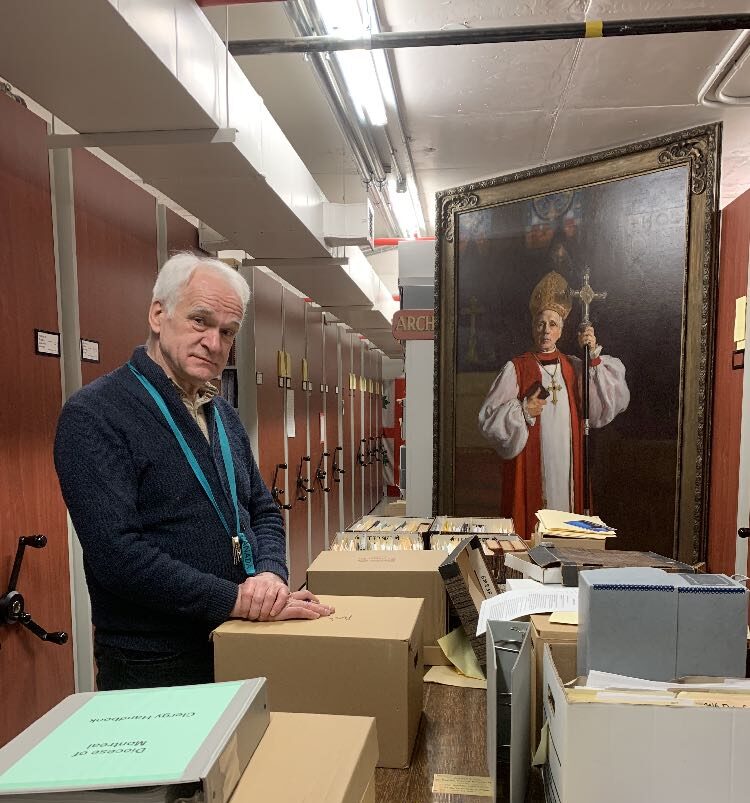At most archives new holdings accumulate quickly. At the Diocesan Archives we have a 25-year backlog on top of our daily work of assisting the Bishop’s Office, assisting researchers online, producing finding aids, keeping track of large and small accessions, and orienting new clergy among other tasks.That backlog has been growing. With the closing of various churches in recent years, the Archivist became concerned about parish records going astray. In parishes where a church is secularized, some parishioners may feel that parish records can be redistributed as the rector or the churchwardens may see fit, either to other parishes, or to individual members of the church being secularized, or even to outside organizations such as a local Royal Canadian Legion. This misinformed notion is at the root of much grief.
Some faithful Anglicans fail to understand that church records still matter long after a parish closes its doors. For instance, architectural plans, building specifications and insurance policies may be sought out by the group taking over a secularized church.
Many years after a church has closed, people (and even their descendants) will still need to obtain certificates of their birth/baptism, confirmation, marriage and burial to prove they existed, or that they can claim Indigenous status, or that their name changed at some point in the past—as, for example, when they married. And there are other reasons these records are sought out.
From when the first Anglican clergy began ministering in the territory we today call the Diocese of Ottawa 236 years ago, a consistent priority has been to create, maintain and preserve parish registers containing all Anglican births, baptisms, confirmations, marriages and burials. That has been done despite families moving in, moving away, and despite small churches opening, proliferating and closing over the centuries.
Parish registers are especially crucial documents in the Deanery of West Quebec, since up until 29 years ago there was no civil registration in the province of Québec: hence parish registers for many in that province are the only proof of birth, marriage, death and name change.
In Ontario, by contrast, there has been civil registration since 1869, which means that all people alive today who were born, married and died in Ontario should be covered in the vast record-keeping system of that province. Proof of baptism can make the difference in whether or not a child is accepted as a student at a Roman Catholic separate school in Ontario. Such proof can only be found in a parish register.
To address the challenge of keeping track of all births, baptisms, marriages and burials recorded in its parish registers, the Diocesan Archives over the past 33 years has been building a database listing baptisms, marriages and burials, to locate names quickly—thereby reducing wear and tear on parish registers, archivists, and on researchers themselves. As the number of parish registers grows (the 1056th was tallied in November 2023), we care that parish registers out in parishes risk being destroyed, even stolen.
At this point I can imagine some readers saying to themselves, “Surely this can’t be! No one would ever steal a parish register, let alone destroy one! The Registrar must be exaggerating!”
So you might think. But it is only a few years ago that thieves broke into Saint Mary’s Church, Navan, and removed a portable safe. They probably hoped it contained money when they returned to their lair. Instead, what they found were the current parish registers in use at Navan—ostensibly placed there to protect them in case of fire. Despite the parish giving out notice on the CBC and in the Ottawa Sun in hopes of getting these registers returned to the parish, they never reappeared—thereby inflicting a major gap in the record of baptisms, marriages and burials for that parish.
But the road to destroying parish registers can also be paved with the very best of intentions. Witness the occasion when a priest serving a parish of the Diocese became ill, and their family rallied around to provide support. Their care included a general cleanup of the rectory, including tossing the current parish registers into a dumpster—thereby erasing 10 years of baptisms, confirmations, marriages and burials at one fell swoop—a record available nowhere else and now rotting in some unspecified landfill.
In response to such situations, in an attempt to prevent further such losses, the Diocesan Archives has adopted a policy of going out to parishes every few years to photocopy parish registers still in use in churches. It does so in an effort to prevent vital information being lost. Once the original parish register finally is deposited in the Diocesan Archives (where a Canon of General Synod stipulates it MUST be deposited once the register is full, or a church closed) they cease to be the responsibility of clergy, and become the responsibility of the Diocesan Registrar.
One last point. It is Archives policy NOT to make these records available to commercial agencies such as ancestry.ca. Why? Recent parish registers contain confidential information, which potentially could lead to a parish (or even the Diocese) being sued should such information be made public. Parish registers are records that belong to the Church and are the responsibility of the Church to maintain. The maintenance of and access to these parish registers is the responsibility of the Church alone. Only the Church determines who has access to them, hence it alone receives payment for issuing certificates to the individuals concerned. In a word, the Church is responsible for how parish registers are used.
This article was originally part of the Archives full report to Synod 2023.


Week of Prayer for Christian Unity annual service to be celebrated at Saint Paul University on Jan. 22